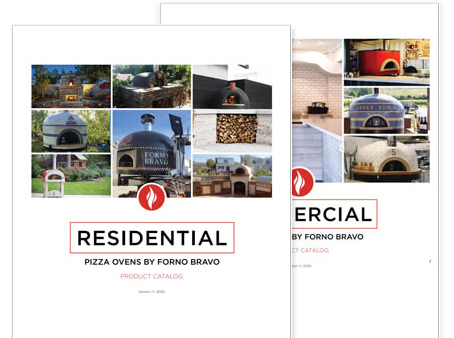New Third Generation FB Castable
Apr 12, 2012Posted by Forno BravoThis is the original version of the article I wrote on the new third-generation FB Castable. A shorter version of this appeared in the March 2012 Wood-Fired Newsletter.
James
We have developed a great deal of expertise at Forno Bravo over the years with refractory materials and insulators, and we have worked hard to continually improve. We are proud to introduce the third generation of FB Castable, the material we use to produce our wonderful ovens. In fact, we have been shipping ovens with the new material for a number of months — and everything is going really smoothly; so we wanted to share the news with you. Plus, FB Castable is designed, blended and cast at our own factory in California (made in USA).
Our new material features a new and more complex array of refractory aggregates (calcined material in different shapes and sizes that create a structural web) that creates an even stronger ceramic bond, along with a higher grade of calcium aluminate cement — and it delivers an awesome (and industry-leading) 8,230 psi compression strength. That means better cooking performance and better durability.
In one sense, it all started with the first modular oven that I bought and installed in San Gimignano. Before I visited the oven factory, I found a company brochure for the producer at a local garden center and I spent a very contented afternoon sitting in the autumn sunlight and translating the Italian. The installation instructions were very helpful — particularly considering that my first experiences with brick ovens were Alan Scott’s Bread Builders and the two barrel vault brick bread ovens that I had built in my house in California.
But while the installation instructions were good, I was particularly struck by the fact that each residential oven was available in two versions — one in a red colored material and the other in grey. After struggling with my bad Italian, and the fact that the brochure had a number of technical terms that could not be translated online, I came to the realization that the company was following the traditional “good” and “best” product strategy, where the red oven was made using a product that roughly translated to “small volcanic pieces”. The grey ovens, on the other hand, were easy to identify. The company called them “refrattario”.
I met the company owners armed with a number of questions, and they did not disappoint me with the answers. The red ovens were in fact made using a locally sourced terracotta material strengthened with a heat resistant volcanic aggregate, which was significantly less expensive than true refrattario. And because in their minds the ovens were for occasional, hobby use (their word in this case), the red terracotta material wasn’t great, but it was basically good enough. Of course if you were serious, they said, you would pay a lot more for a true refractory oven — which used the same material as their restaurant ovens. But, they were a lot more expensive.
As a buyer, I thought this was confusing and it made the decision harder than it should be. Was the cheaper oven good enough? Would it work well and last? Should I pay a lot more for the better oven?
I decided from day one that Forno Bravo would use the same commercial-grade, true refractory material for all of our ovens. And over the years, we have continually improved our ovens and the materials we use.
Which is why we are so excited to announce the third generation of FB Castable. This true refractory material is our own proprietary technology that delivers remarkably fast heat-up times, great heat retention and unrivaled durability. It is incredibly strong.
You can read more about it on Fornobravo.com. Link to this page:
http://www.fornobravo.com/pizza_oven_selection/refractory_primer.html





